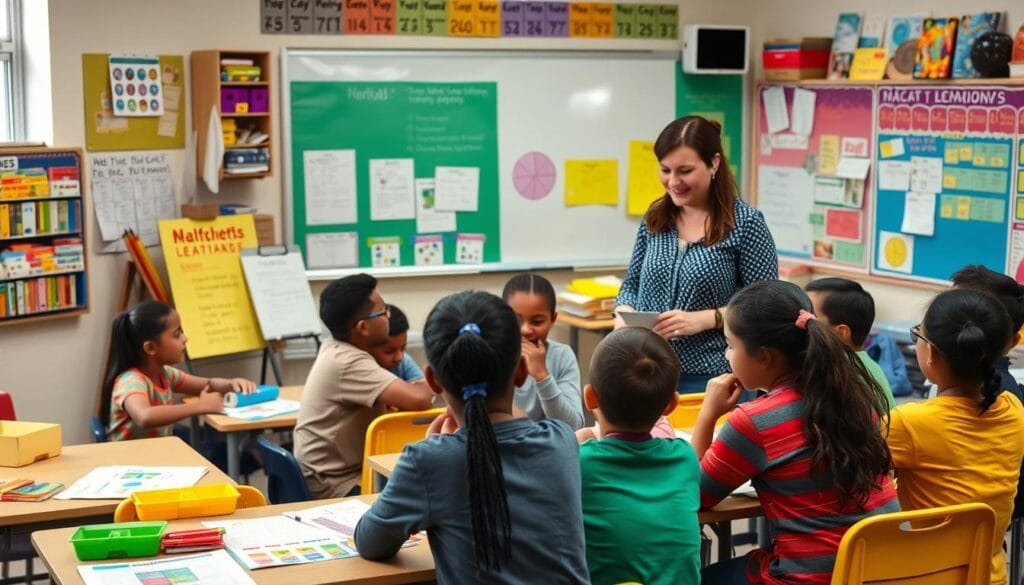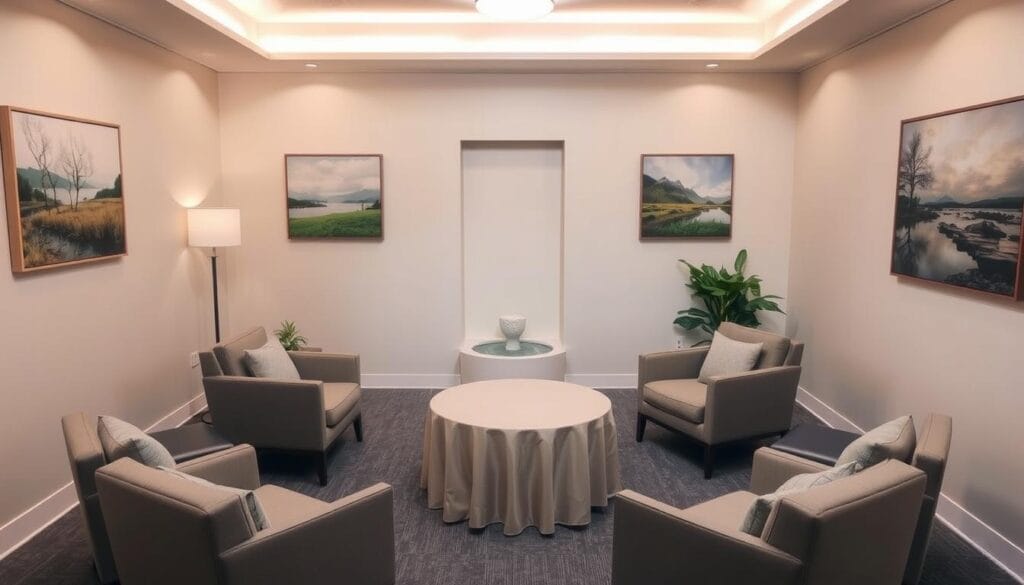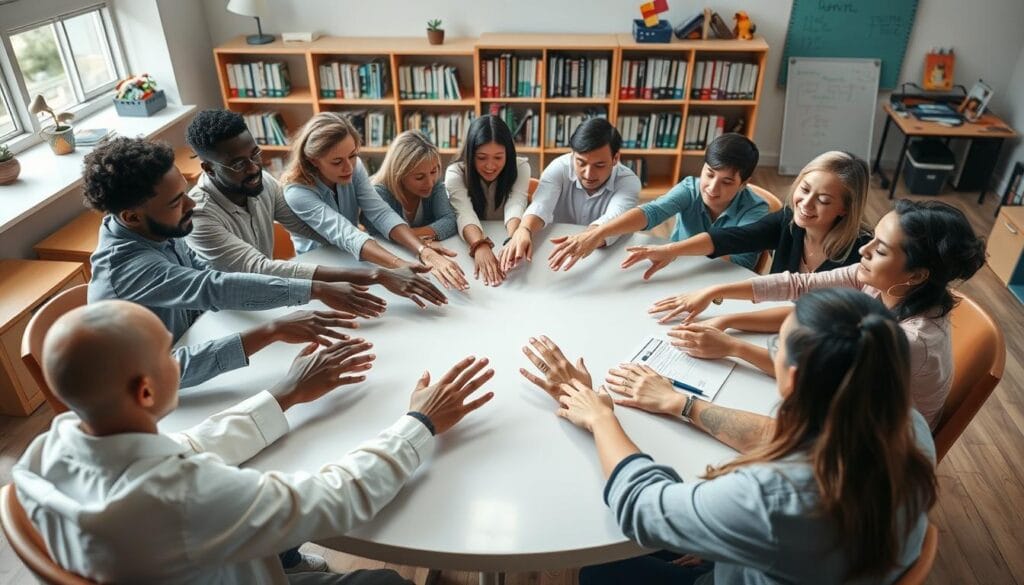Effective Strategies for Resolving Parent-Teacher Conflicts
As a parent or teacher, you are key in a child’s education. But, disagreements can happen, affecting the student’s learning and happiness. To solve these, we need to talk well, work together, and focus on the child’s success.
فهرس المقالة
Understanding the Root Causes of Parent-Teacher Conflicts
Dealing with the complex relationship between parents and teachers can be tough. But knowing what causes these conflicts is key to solving them. Issues like different academic goals and classroom behavior problems can strain this relationship.
Common Triggers of Educational Disputes
One big reason for conflicts is when parents and teachers see a student’s grades differently. Teachers look at grades and classroom life, while parents have their own views. If they don’t talk well, things can get worse.
Impact on Student’s Academic Performance
When parents and teachers disagree, students suffer. They might feel stressed, lose focus, and feel like they don’t belong in school. This can really hurt their grades and future success.
Emotional Factors in Conflicts
There are deep feelings behind these conflicts. Parents want to protect their kids, and teachers might feel misunderstood. To solve these problems, we need to listen, understand, and find common ground.
By knowing why conflicts happen, we can work together. This helps students succeed and creates a better learning place for everyone.
| Common Triggers of Parent-Teacher Conflicts | Impact on Student’s Academic Performance |
|---|---|
|
|
“When parents and teachers are on the same page, the student has the best chance of succeeding. Understanding the root causes of conflicts is the first step towards building a strong partnership.”
By tackling the real issues behind conflicts, we can make learning better for students. This helps them grow both in school and in life.
Building Strong Communication Foundations

Effective communication techniques are crucial for a good parent-teacher partnership. Regular, open talks help avoid misunderstandings and create a positive learning space. Relationship building is vital for trust and respect between parents and teachers, helping solve any problems.
Begin by setting up regular meetings, in person or online, to talk about your child’s progress and goals. Make sure both sides listen well, ask questions, and give helpful feedback. This teamwork ensures everyone is working for the student’s benefit.
Here are some ways to improve your communication techniques and relationship building:
- Set up clear ways to talk, like email, phone, or a special app, for quick and easy updates.
- Ask parents to share their thoughts and observations about their child’s learning and behavior. This helps teachers understand better.
- Work on respect and understanding for each other’s views and skills. This makes communication better.
- Deal with problems quickly, instead of letting them get worse.
By focusing on communication techniques and relationship building, you can build a solid base for solving conflicts and supporting your students’ growth.
“The quality of our communication is the quality of our life.” – Anthony Robbins
Parent-Teacher Conflict Resolution Strategies
Resolving conflicts between parents and teachers needs a smart plan. It should focus on mediation skills and working together to solve problems. By finding the real reasons for these disputes and using good ways to fix them, you can make a better learning place for your child.
Professional Mediation Techniques
When disagreements happen, getting a neutral third-party mediator can help. They make sure everyone can talk openly and find a solution that works for both. Mediators are experts in conflict management and help both sides share their worries, find the real issues, and look for good solutions.
Collaborative Problem-Solving Methods
- Listen carefully to what the other side is saying and try to understand their worries.
- Look for things you both want, instead of focusing on what you disagree on.
- Think of new ways to solve the problem that meet both your needs.
- Work together to find a middle ground that everyone can agree on.
Setting Clear Expectations
To avoid future problems, it’s key to set clear rules from the start. Talk about how you will communicate, what you expect in school and behavior, and what each of you will do. By setting these rules early, you can avoid misunderstandings and work better together.
“Effective conflict resolution requires empathy, compromise, and a shared commitment to the student’s success.”

Implementing Active Listening Skills
Effective conflict resolution between parents and teachers relies on active listening. It’s more than just hearing words; it’s about truly understanding the speaker’s point of view. By showing active listening, both sides can have a constructive dialogue. This leads to finding solutions together.
To improve active listening, try these strategies:
- Focus your attention: Stay away from distractions and give the speaker your full attention. Show you’re engaged by making eye contact, nodding, and using open body language.
- Reflect and paraphrase: Summarize what you’ve heard to make sure you got it right. This shows you’re listening and want to understand better.
- Ask clarifying questions: If something is unclear, ask questions to get a better grasp of the issue.
- Withhold judgment: Don’t interrupt or think of a response while the other is speaking. Approach with an open mind.
- Empathize and validate: Show you can see things from the speaker’s point of view and respect their feelings, even if you don’t agree.
Using active listening techniques helps parents and teachers have a constructive dialogue. This dialogue builds understanding and helps solve problems together.
| Active Listening Techniques | Benefits |
|---|---|
| Maintaining eye contact and open body language | Demonstrates engagement and attentiveness |
| Paraphrasing and reflecting back | Ensures accurate understanding of the speaker’s message |
| Asking clarifying questions | Promotes a deeper exploration of the issue |
| Withholding judgment | Fosters an open and impartial mindset |
| Validating feelings and perspectives | Builds empathy and trust in the relationship |
“The greatest communication skill is the willingness to listen.” – Larry King
By using active listening and constructive dialogue, parents and teachers can turn conflicts into chances for understanding and working together.
Creating a Positive Partnership Environment
Building a strong partnership between parents and teachers is key to student success. Trust, clear communication, and cultural sensitivity are crucial. They help create an environment where families and educators can work together towards common goals.
Establishing Trust and Respect
Trust is the base of any good relationship. Be empathetic, genuine, and eager to understand each other’s views. Listen well, acknowledge concerns, and find solutions together. Trust leads to respect, making teamwork easier.
Regular Communication Channels
- Set up a system for regular updates, like parent-teacher meetings and progress reports.
- Use different ways to communicate, like email, phone, and face-to-face talks, to fit everyone’s needs.
- Encourage both sides to start conversations, creating a dialogue and shared responsibility.
Cultural Sensitivity Awareness
Value and celebrate the cultural diversity of your students and their families. Learn about different communication styles and values. This helps build a welcoming and understanding relationship.
By embracing these differences, you strengthen relationship building and educational policies in your school.
“When families and teachers work together as partners, students thrive both academically and socially.”
Addressing Academic Performance Concerns
As a parent or teacher, talking about a student’s grades can be tricky. But, with the right strategies and teamwork, you can find solutions. It’s all about being kind, open, and working together for the student’s success.
Start by looking at what the student does well and what they struggle with. Check their test scores and assignments. This helps you understand what’s going on and how to help.
- Work together to find practical solutions.
- Make a clear plan with goals, tasks, and deadlines.
- Keep an eye on how the student is doing and change the plan if needed.
It’s important to talk openly and honestly. Let the parent or teacher share their thoughts and listen carefully. This way, you build trust and work as a team for the student’s success.
| Strategies for Addressing Academic Performance Concerns | Key Benefits |
|---|---|
| Collaborative problem-solving | Helps understand the problems and find the right solutions |
| Clearly defined action plan | Provides a clear path to improvement with goals and steps |
| Ongoing progress monitoring | Allows for quick changes to keep the student growing |
| Open and honest communication | Builds trust and ensures everyone is on the same page |
By working together and focusing on the classroom, you can help the student succeed. Remember, it’s all about teamwork and finding the best way to meet the student’s needs.

Managing Behavioral Issue Discussions
Talking about behavioral issues with parents is delicate. It’s important to have clear plans, focus on solutions, and follow up consistently. This way, you can tackle problems while keeping communication open and working together.
Documentation Best Practices
Keeping detailed records is crucial for behavioral issues. Write down each incident’s date, time, description, and actions taken. This helps track events and aids in discussions with parents. Make sure records are accurate, fair, and easy for everyone to see.
Solution-Focused Approaches
Focus on solutions, not just problems, when dealing with behavior. Work with parents to find the cause and fix it. This way, you both can create plans that work for everyone.
Follow-up Protocols
Following up regularly is key for managing behavior. Set up a system to check on progress, share updates, and change plans if needed. This keeps everyone informed and helps the student succeed.
Using these strategies for handling behavioral issues makes you more confident. It helps improve communication techniques and conflict management. This benefits the student’s happiness and school success.
Navigating Special Education Conflicts
Dealing with special education can be tough for parents and teachers. It’s key to handle conflicts with care and focus on the student’s needs. Knowing educational policies and mediation skills helps find solutions for students with special needs.
Understanding everyone’s rights and duties is a first step in solving special education conflicts. Knowing about the Individualized Education Program (IEP) is crucial. It outlines a student’s educational plan and needed accommodations. Working together with teachers and staff ensures the IEP is followed and updated as needed.
Addressing Special Education Concerns
When special education issues come up, it’s important to look for solutions. Common issues include:
- Disagreements over the right educational setting or placement
- Questions about the IEP’s quality or how it’s being used
- Concerns about related services like speech or occupational therapy
- Disputes over whether a student qualifies for special education
In these cases, mediation skills are very helpful. They help everyone talk openly and find solutions that focus on the student’s needs.
| Conflict Resolution Strategies | Key Considerations |
|---|---|
| Collaborative Problem-Solving | Encourage all parties to actively participate in the decision-making process, focusing on the student’s best interests. |
| Formal Dispute Resolution Processes | Be familiar with the available dispute resolution options, such as mediation, due process hearings, or administrative complaints. |
| Building Positive Relationships | Cultivate an environment of trust, respect, and open communication between parents and educators. |
By using educational policies and mediation skills to handle special education conflicts, we can make sure every student gets the support they need. This helps them do well in school and in life.
Utilizing School Resources and Support Systems
As a parent or teacher, you have many resources and support systems at your school. School administrators, counselors, and staff can help with conflicts or challenges. They offer guidance, mediation, and strategies to improve education and relationships.
Working with your school’s administration can help solve problems. You can develop plans that put the student’s best interests first. School counselors help by facilitating communication between parents and teachers. They help find the root causes and solutions that everyone agrees on.
Your school might also have workshops or PTA meetings. These are great places to meet other families and educators. You can share experiences, learn from each other, and build a stronger community. Using these resources helps you handle conflicts better and creates a positive educational environment for everyone.
FAQ
What are the common triggers of educational disputes between parents and teachers?
Educational disputes often start from misunderstandings about school expectations. They can also stem from behavioral issues, communication problems, and different views on a child’s learning.
How can parent-teacher conflicts impact a student’s academic performance?
Conflicts between parents and teachers can really hurt a student’s grades. They create stress and confusion. This makes it hard for the child to focus and do well in school.
Why is it important to establish effective communication channels between parents and teachers?
Good communication is key to avoiding and solving disputes. It helps create a positive learning environment. It also makes sure the child’s needs are met.
What are some professional mediation techniques for resolving parent-teacher conflicts?
To solve disputes, professionals use active listening and finding common goals. They look for solutions that both sides can agree on. They also make plans for what to do next.
How can parents and teachers engage in collaborative problem-solving to address issues?
Parents and teachers can work together to solve problems. They identify the issue, come up with solutions, and make a plan. This way, they focus on what’s best for the child.
Why is it important for parents and teachers to set clear expectations?
Clear expectations prevent future problems. They help everyone understand what’s expected. This makes working together easier and helps the child do well in school.
How can active listening skills improve conflict resolution between parents and teachers?
Listening well is crucial for solving disputes. It shows respect and helps everyone understand each other. This leads to better conversations and finding solutions.
What strategies can help build a positive partnership between parents and teachers?
Building a good partnership involves trust and respect. Regular communication and working together on goals are also important. This helps the child grow and succeed.
How can parents and teachers address concerns about a student’s academic performance?
Parents and teachers should talk openly about a student’s grades. They should find the cause, make a plan, and check progress. This teamwork helps the child get the support they need.
What are some best practices for discussing and managing behavioral issues?
When dealing with behavior, it’s important to document everything. Look for solutions that fix the problem. Make sure to follow up to keep things consistent.
How can parents and teachers navigate conflicts in special education situations?
In special education, it’s important to know your rights and roles. Be involved in the IEP process. If needed, seek help from school or outside resources. This ensures the child gets the right help.
What school resources and support systems are available to help resolve parent-teacher conflicts?
Schools have many resources to help with disputes. Administrators, counselors, and special education experts can help. They facilitate talks, provide mediation, and support positive relationships.






